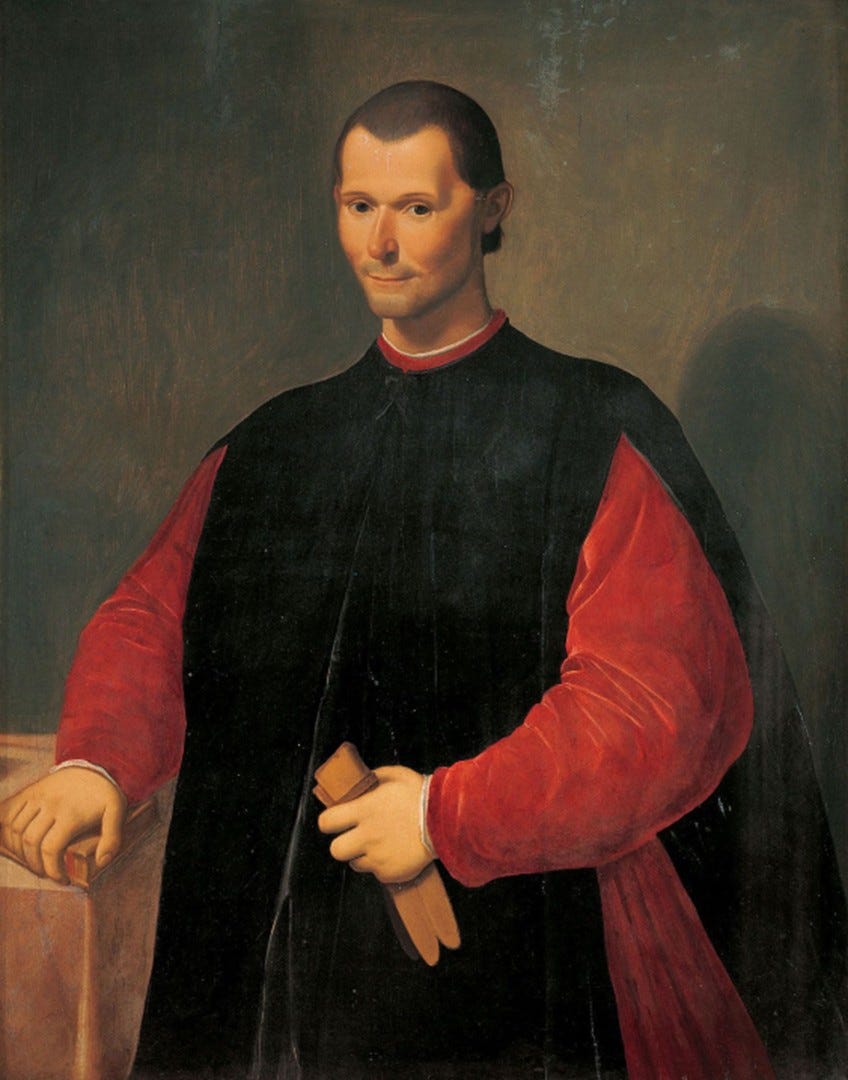Is it better to be loved or to be feared? That’s a question addressed by Niccolò Machiavelli, the 16th-century political thinker, in his famous book The Prince. He deals with other issues, but that’s the one which is considered to be the most intriguing, the one which is the most discussed. According to Machiavelli, if a political leader is able to be both loved and feared, that is best, but the two don’t easily go together, if at all.
[Niccolò Machiavelli, 1469–1527]
Machiavelli argues that the problem with being loved is that people may eventually take advantage of you. Perhaps he is sadly accurate in his assessment of human nature when he says if a leader shows too much compassion, the people will want more and more. They will begin to throw off restraint. Thus, the need for a firm hand. Being feared is safer. If people know they better toe the line or else face, let’s say, unpleasant consequences, it’s an effective way to maintain order and to eliminate dissent. It’s the rather cynical, “you’ve got to break some eggs to make an omelet” approach to life.
On the other hand, it’s important to not take it too far. Excessive fear can turn into hatred, which can lead to open rebellion. For one in authority, that spells danger. Actually, that spells danger for those not in government. It’s not good for those in business, in the school system, in the church!
Unfortunately, I think we know what rebellion in the church can look like!
Is it better to be loved or to be feared? Some might say the opposite of love is hate. We’re told love and hate cannot co-exist. However, I might respond with the reality of a love-hate relationship. Love and hate, as emotions, are powerful and passionate. However, there is a thin line between them.
There’s a passage in 1 John which suggests the opposite of love is fear. “There is no fear in love, but perfect love casts out fear; for fear has to do with punishment, and whoever fears has not reached perfection in love” (4:18).
Let me expand on my original question, “Is it better to be loved or to be feared?” I would say those who want to be feared are filled with fear themselves. They sense an insecurity within, an inner dread, perhaps a feeling of worthlessness, and they feel the solution is to command respect, twisted though it may be, which is produced—which is created—by the fear from others. Is it out of line to suggest that all the weapons we invent, especially the really powerful ones, demonstrate not how strong we are, but how scared we are?
Let me quickly add I’m not saying everyone who is filled with fear demands to be feared. That is not at all the case. In one way or another, we all deal with fear. At the same time, those who desire to be feared are at heart seeking love; they seek affirmation. We have been created for love by the one who is love. As we read in verse 16, “God is love.”
If God is love, then why are we so fearful? Here’s an interesting example. Whenever angels appear in the scriptures, they are not the cute, warm, and fuzzy creatures we like to imagine. They are fierce, and yet they often say something along the lines of, “Fear not.” In fact, that’s one of Jesus’ favorite lines.
“Love has been perfected among us in this: that we may have boldness on the day of judgment” (v. 17). Love has been perfected. The Greek word (τελειοω, teleioō) has the meaning of “has been completed,” “has been accomplished.”
Fear has to do with punishment. We might want to avoid punishment, or at least lessen it, if we throw ourselves on the mercy of the court.
With that in mind, I have a little story from when I was a small boy, maybe four or five years old. If I did something I knew I shouldn’t have done, on occasion I would rat myself out to my mother. I would confess my crime. I figured if I came forward before my misdeed had been discovered, I would gain leniency. And it always worked!
There were times, though, when my transgression went undetected. I got away with it, or so I thought.
One day when we were living in California, I wanted to get into our locked garage. Not having the key, I tried pushing a stick into the lock, hoping it would work as a makeshift key. It broke off, jamming the door. When asked about it, I blamed my sister. She got a spanking. I stayed quiet for years—until the truth finally came out, long after the statute of limitations had passed!
Framing my sister wasn’t an act of hatred—but it certainly wasn’t an act of love!
Fear has to do with punishment. Dare we say we have a guilty conscience? But if love is perfected, we have boldness on the day of judgment.
Rudolf Bultmann, a renowned German theologian of the twentieth century, said of the human race, “the eschatological hour is first of all an hour of dismay.” (592) The word “eschatological” refers to the end times, the end of the world as we know it. When the bell tolls, so to speak, it is an hour of dismay. It is a time of alarm. The reason for that is because we know we haven’t been perfected; our love isn’t complete. We have fallen short. Love is perfected because of Christ.
Chapter 4 ends by telling us we can’t claim to love God if we don’t love our brothers and sisters—indeed, if we actually hate them. By framing my sister, I was not showing hatred, but I certainly was not showing love either!
Fear is suspicious. Fear keeps us from opening our hearts to each other. Fear keeps us stuck in the way things are. It robs us of creativity, to imagine other possibilities.
This helps us understand what John means when he speaks of “the world”—the κοσμος (kosmos). As scholar Michael Rhodes puts it, “John tells us all is not well in God’s good world… The kosmos has become a battlefield, and all humanity is caught up in the conflict.” It’s the place where fear reigns over love.
This distorted love of the world isn’t limited to the ancient kosmos. We still see it today—in art, media, politics.
For those who have seen the movie Scarface, remember Al Pacino’s character, Tony Montana? He’s asked by his partner what he expects: “The world, chico, and everything in it.” In designing a cheesy statue that fits a wannabe dictator’s dreams, he takes inspiration from a blimp he happens to see that says, “The world is yours.”
Need I say, he was not a guy noted for spreading the love around?
Fortunately for us, God isn’t content with leaving the world as it is. Rhodes tells us, “For John, the world is finally and fully the world that God so loved that he sent his only Son as a ‘Savior of the kosmos’ (4:14). In Jesus, the Creator has returned to reclaim what is his—a rescue operation that has required him to ‘destroy the works of the devil.’” He envisions an action movie!
“To be a disciple, then, is to find oneself transferred from the kosmos under the control of the devil and into the realm of the God who is Light.”
If one is under control of the devil, it is difficult, to put it lightly, to be a disciple of the Lord. Now it has become “a glorious possibility for us as those born again by the Spirit of God.”
He tells us something I think we’re all going to love. As the church, “because every child of God began life in enmity to God under the influence of the demonic, such a community is also always intrinsically missional. The doors of the church are always open to any and all of the devil’s children who are willing to come in and be reborn.”
Again I ask, “Is it better to be loved or to be feared?”
The word “world” (kosmos) has another meaning, which is “system.” As before, it can have a positive connotation, but John is here using it in a negative sense. It is the system as trapping us, working against the Spirit of God. It is the system as robbing us of our freedom, quenching the liberating Spirit.
Bultmann says this: “Again and again the world seems to conquer, and again and again the disciple wavers and seeks refuge in his native haunts, in the world, leaving Jesus alone… In fact he is not abandoning [Jesus] to the world, but by imagining him to be so abandoned and by despairing of him he is rather abandoning himself.” (592)
Let’s ask ourselves: how often do we abandon ourselves? How often are we conquered by the world?
Still, all is not lost, “for whatever is born of God conquers the world. And this is the victory that conquers the world, our faith” (v. 4). On a side note, you already know the Greek word that “conquer” and “victory” come from: νικη (nikē), which we pronounce like the shoe, Nike.
The conquering—the overcoming—goes on, because “in [Jesus] the Father is at work, the Father with whom he is one, and therefore…in his apparent defeat he is in fact the conqueror.” One of my favorite scriptures in the entire Bible comes in the gospel of John, when Jesus is about to leave the upper room and go into the dark, to face betrayal and arrest. He tells the disciples, “In the world you face persecution. But take courage; I have conquered the world!” (16:33). His defeat sure doesn’t look like victory.
So we have the joyful question, “Who is it that conquers the world but the one who believes that Jesus is the Son of God?” (v. 5). Believing that Jesus is the Son of God means many things. Jesus as Son of God brings freedom, not compulsion. Jesus as Son of God brings clarity, not confusion. Jesus as Son of God brings courage in the face of fear. Jesus as Son of God is light in the dark.
And that is how love conquers—and fear abandons.







